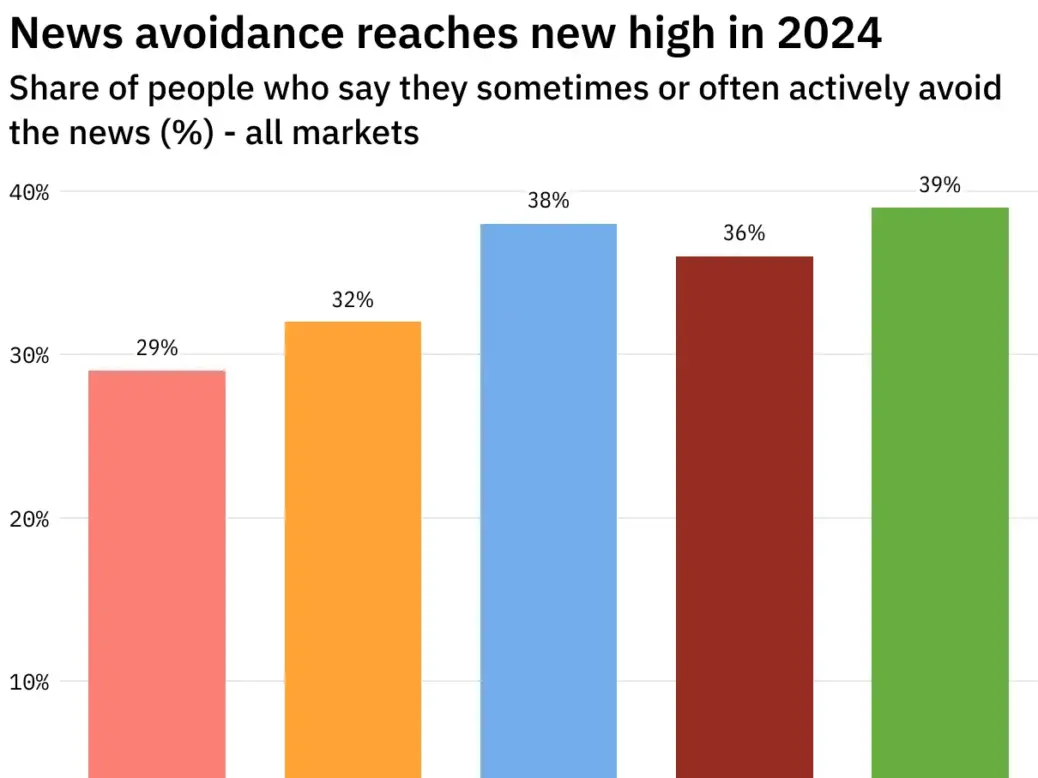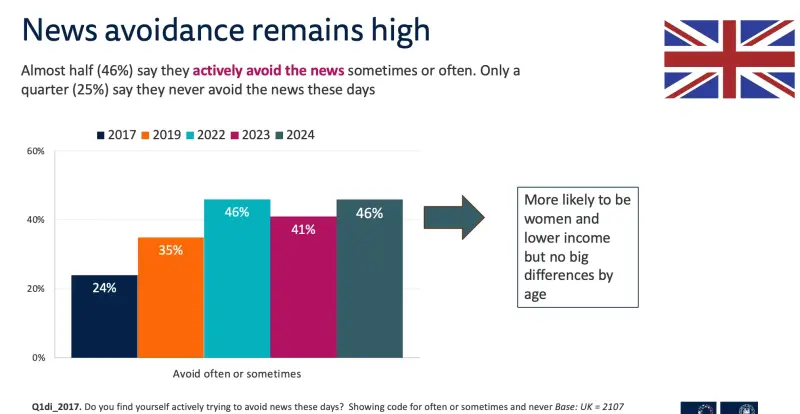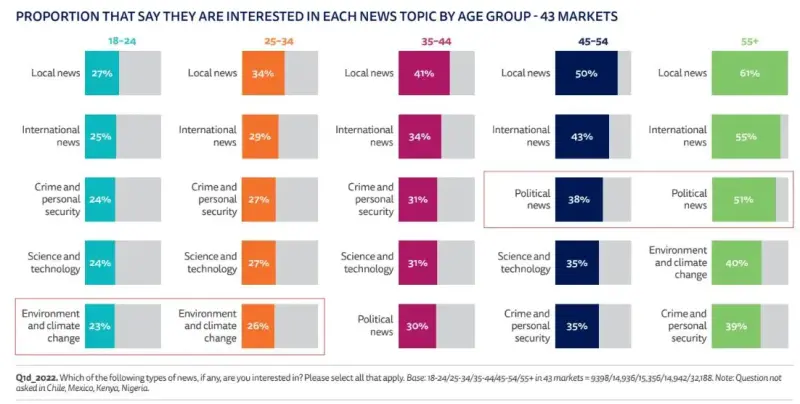
The proportion of people selectively avoiding the news is now ten percentage points higher than it was seven years ago, reaching a new high of 39% across 20 key markets.
This is the highest level of news avoidance recorded since the Digital News Report by the Reuters Institute for the Study of Journalism began in 2012. Previously the high was 38% in 2022.
In the past year selective news avoidance has grown by three percentage points. The biggest increases were in Ireland (up by ten percentage points to 44%), Spain (+8pp to 37%), Italy (+7pp to 36%), Germany (+5pp to 37%), Finland (+5pp to 26%), the US (+5pp to 43%) and Denmark (+4pp to 23%).
The proportion of people in the UK saying they actively avoid the news sometimes or often is up from 24% in 2017 to 46% in 2024 - the same level as in 2022 although it had seen some improvement to 41% in 2023.
The UK was ninth highest for news avoidance out of 47 markets surveyed. Top of the table were Bulgaria (60%) and Greece (59%).
Just 25% of the 2,017 UK respondents to the Digital News Report survey said they never avoid the news these days.
News avoidance was a bigger phenomenon among women, of whom in the UK 52% said they sometimes or often avoid news compared to 41% of men.
It was relatively even across age groups, affecting 49% of 25 to 34s, 35 to 44s and 45 to 54s. It was also reported by 43% of 18 to 24s and 44% of 55 and overs.

News avoidance triggered by 'depressing' and 'relentless' cycle
One 45-year-old woman in the UK told the Digital News Report: "World news is far too depressing at the moment with most news channels reporting on the same things."
The report added that the news is not just "depressing" - it's "relentless".
Four in ten (39%) people across all markets said they felt "worn out" by the amount of news nowadays, up from 28% in 2019, with coverage of "wars, disasters, and politics" all cited as squeezing out other areas.
"The increase has been greater in Spain (+18pp), Denmark (+16pp), Brazil (+16pp), Germany (+15pp), South Africa (+12pp), France (+9pp), and the United Kingdom (+8pp), but a little less in the United States (+3pp) where news fatigue was a bigger factor five years ago.
"There are no significant differences by age or education, though women (43%) are much more likely to complain about news overload than men (34%)."
The report suggested the increased use of smartphones, push notifications and algorithm-based platform feeds since the Digital News Report began as potential reasons for this overload.
A 71-year-old man in the UK said: "The sheer volume of information is overwhelming. We can be left feeling helpless in the face of another remote disaster, leaving you feeling guilty and impotent."
And a 27-year-old man in the US told the survey: "There’s too much news nowadays... some are fake and some are real, but I get confused and get a headache."
Finland is only country not to see long-term decline in interest in news
The long-term trend in interest in news is down in every country surveyed apart from Finland. In the UK interest in news has almost halved since 2015, with a fall from 70% saying they were extremely or very interested in news then to 38% this year.
"Women and young people make up a significant proportion of that decline," the report said.
The UK's was one of the biggest drops in percentage points, alongside Spain (down from 85% in 2015 to 52%) and Argentina (down from 77% showing interest in news to 45%). However a short-term stabilisation in Argentina (it was lower, on 43%, last year) was put down to presidential election in late 2023.
However, not all countries saw such a big drop in interest. The US, on 52% this year, was down from 67% in 2015 but up from a low of 47% in 2022. The Netherlands and South Korea saw single-figure long-term falls in interest.
Finland was the only country not to see decline in the long-term, going from 64% showing interest in news in 2015 to 65% this year.
Survey respondents were asked what types of news topics they were most interested in. Local and international news were the two most important for all age groups, but while political news was third for 45s and overs, it did not make the top five for 34s and unders. They were more interested instead in environmental and climate change news.

People felt that their interest in topics like sport, politics and business news was generally well met, but that areas like education, environment and social justice were lacking.
Could 'user needs' models help reduce news avoidance?
The Digital News Report noted that numerous newsrooms around the world have introduced "user needs" models aimed at making the news more accessible and engaging by supplementing news updates with stories that "educate, inspire, provide perspective, connect, or entertain".
Almost three-quarters (72%) of people across all markets said news that keeps them up to date with what's going on was most important to them, followed by news that educates them (67%) and news that offers different perspectives (63%).
The report said: "This is pretty consistent across different demographic groups, although the young are a bit more interested in stories that inspire, connect, and entertain when compared with older groups.
"In the United States, for example, over half (52%) of under 35s think having stories that make them feel better about the world is very or extremely important, compared with around four in ten (43%) of over 35s."
The report authors said of the survey data that "taken as a whole, it is clear news consumers would prefer to dial down the constant updating of news, while dialling up context and wider perspectives that help people better understand the world around them.
"Most people don’t want the news to be made more entertaining, but they do want more stories that provide more personal utility, help them connect with others, and give people a sense of hope."
Email pged@pressgazette.co.uk to point out mistakes, provide story tips or send in a letter for publication on our "Letters Page" blog







